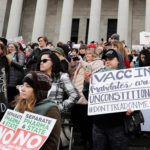 Social media has long been accused of spreading misinformation, and the scale of this was underlined by a recent study from the University of Pennsylvania, which explored how well informed people were about vaccines depending on the sources of their information.
Social media has long been accused of spreading misinformation, and the scale of this was underlined by a recent study from the University of Pennsylvania, which explored how well informed people were about vaccines depending on the sources of their information.
The research was conducted during 2019, at a time when the United States was experiencing the biggest measles outbreak in over 25 years. Surveys were conducted in spring and autumn to gauge the level of vaccine misinformation among participants, and the changes in this misinformation during the timeframe.
The data revealed that around two-thirds of people were less informed in autumn than they were in spring, and the researchers believe that media consumption patterns are a contributory factor. It emerged that those most likely to suffer from greater misinformation were exposed to more information about the MMR vaccine on social media. By contrast, those who primarily heard about measles and the vaccine through other channels became more informed.
“People who received their information from traditional media were less likely to endorse anti-common vaccination claims,” the researchers explain.
Misinformed media
The accusation that social media is awash with misinformation is nothing new, but the scale, and speed, of misinformation is still worrying. The data showed that not only does people’s knowledge worsen after exposure to social media, but their level of trust in experts also diminished. This in turn coincided with believing misinformation about vaccines.
The data suggests that the extensive information campaign by the CDC was largely ineffectual at changing people’s awareness and understanding of the vaccine. Indeed, among those whose knowledge changed between spring and autumn, most suffered a decline.
While the findings are a case of correlation rather than causation, the researchers believe they are nonetheless important for policy makers to ensure the effectiveness of public health campaigns. They also underline the importance of recent decisions by various social networks to either reduce or block access to misinformation about vaccines.